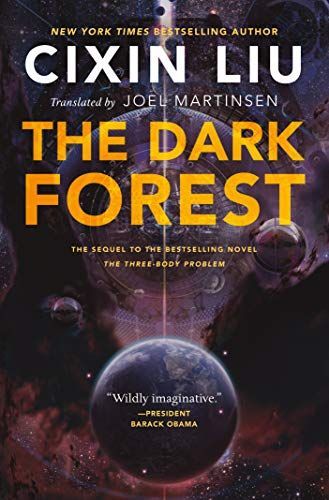
The Dark Forest
Soon to be a Netflix Original Series! "Wildly imaginative." —President Barack Obama on The Three-Body Problem trilogy This near-future trilogy is the first chance for English-speaking readers to experience this multiple-award-winning phenomenon from Cixin Liu, China's most beloved science fiction author. In The Dark Forest, Earth is reeling from the revelation of a coming alien invasion-in just four centuries' time. The aliens' human collaborators may have been defeated, but the presence of the sophons, the subatomic particles that allow Trisolaris instant access to all human information, means that Earth's defense plans are totally exposed to the enemy. Only the human mind remains a secret. This is the motivation for the Wallfacer Project, a daring plan that grants four men enormous resources to design secret strategies, hidden through deceit and misdirection from Earth and Trisolaris alike. Three of the Wallfacers are influential statesmen and scientists, but the fourth is a total unknown. Luo Ji, an unambitious Chinese astronomer and sociologist, is baffled by his new status. All he knows is that he's the one Wallfacer that Trisolaris wants dead. The Three-Body Problem Series The Three-Body Problem The Dark Forest Death's End Other Books Ball Lightning Supernova Era To Hold Up The Sky (forthcoming) At the Publisher's request, this title is being sold without Digital Rights Management Software (DRM) applied.
Reviews
Ricky@rickynaarea
Throckmorton@throckmorton
Ghee@clubsoda
div. ☆@sunsidecoast
veralyn@sulleyveralyn
Valerie Yang@val_yang
Eva Ströberg@cphbirdlady
Wingyan Chan@wingyan
Nate@wiredfractal
Malcolm Reddoch@mreddoch
Chaitanya Baranwal@chaitanyabaranwal
Rohit Arondekar@rohitarondekar
Cheryl Hedlund@cappuccino136
Ashlyn@demonxore
Naomi J.@naomij
Bouke van der Bijl@bouk
Obada Mu@obada
Eva Decker@evadecker
Kwan Ann Tan@kwananntan
linda@lkt
Anne @annedemonium
Adam@adam
Katie Chua@kchua
Ethan Ding@ethanding
Highlights
Jasper@jpev19
Page 512
Jasper@jpev19
Page 432
Jasper@jpev19
Jasper@jpev19
Page 305
Jasper@jpev19
Page 178
Jasper@jpev19
Page 163
Jasper@jpev19
Page 139
Naomi J.@naomij
Laura Dobie@MovingToyshop
Page 507